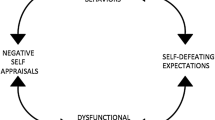Abstract
Clients often enter psychotherapy with struggles and concerns related to their direct experience of emotion. Though most of the major psychotherapy theories in the West address the general issue of emotion, very few have developed a framework or theory for supporting clients in their direct encounters with difficult feeling states. Since Buddhism is highly experiential and Buddhist philosophy is mainly concerned with the issue of human suffering, its relevance to maneuvering difficult emotions in a clinical context is profound. While the use of Buddhist concepts and practices in mental health treatment in the West has proliferated in recent years, the clinical use of Buddhist material has often bypassed the larger philosophical framework of Buddhism. This decontextualized use of Buddhist material has limited the potential value of Buddhist philosophy in mental health treatment. This article offers a conceptual framework for approaching difficult emotions that is grounded in the wisdom of Buddhism. The framework consists of four themes that serve as guides for clients and clinicians as they maneuver emotional experiences in psychotherapy: Sitting With, Middle Path, Healthy Interdependency, and Compassion. Common threads between Buddhist concepts and Western psychotherapy approaches are explored. A case vignette will demonstrate the clinical utility of the framework.
Similar content being viewed by others
References
Applegate, J. S., & Shapiro, J. R. (2005). The brain: An introductory tutorial; the neurobiology of memory; and affect: Toward a neurological integration. In J. S. Applegate & J. R. Shapiro (Eds.), Neurobiology for clinical social work: Theory and practice (pp. 1–39). New York: W. W. Norton.
Batchelor, S. (1997). Buddhism without beliefs: A contemporary guide to awakening. New York: Riverhead Books.
Bloom, S., & Farragher, B. (2011). Destroying sanctuary: The crisis in human service delivery systems. New York, NY: Oxford University Press.
Bowlby, J. (1977). The making and breaking of affectional bonds. Journal of Psychiatry, 130, 201–210.
Brach, T. (2003). Radical acceptance: Embracing your life with the heart of the Buddha. New York, NY: Bantam Dell.
Chodron, P. (2001). The wisdom of no escape. Boston, MA: Shambala.
Courtois, C., Ford, J., & Cloitre, M. (2009). Best practices in psychotherapy for adults. In C. Courtois & J. Ford (Eds.), Treating complex traumatic stress disorders: Scientific foundations and therapeutic models (pp. 82–103). New York, NY: Guilford Press.
Cozolino, L. J. (2002). Rebuilding the brain: Neuroscience and psychotherapy. In L. J. Cozolino (Ed.), The neuroscience of psychotherapy: Building and rebuilding the human brain (pp. 15–45). New York: Norton.
deVibe, M., Bjorndal, A., Tipton, E., Hammerstrom, K., & Kowalski, K. (2012). Mindfulness based stress reduction (MBSR) for improving health, quality of life, and social functioning in adults. Campbell Systematic Reviews, 3, 1–127.
Epstein, M. (1995). Thoughts without a thinker. New York: Basic Books.
Epstein, M. (1998). Going to pieces without falling apart. New York: Broadway Books.
Frankl, V. (1969). Man’s search for meaning: An introduction to logotherapy (I. Lasch, Trans.) (14th ed.). New York, NY: Washington Square Press.
Greenberg, L. S. (2004). Emotion-focused therapy. Clinical Child Psychology and Psychotherapy, 11(1), 3–16.
Hanh, T. N. (1998). The heart of the Buddha’s teaching. New York: Broadway Books.
Hanson, R. (2009). Buddha’s brain. Oakland, CA: New Harbinger.
Hanson, R. (2013). Hardwiring happiness. New York, NY: Harmony.
Jordan, J. (2010). Relational-cultural therapy. Washington, DC: American Psychological Association.
Kabat-Zinn, J., & University of Massachusetts Medical Center/Worcester. Stress Reduction Clinic. (1990). Full catastrophe living: Using the wisdom of your body and mind to face stress, pain, and illness. New York: Delacorte.
Lynch, T. R., Chapman, A. L., Rosenthal, M. Z., Kuo, J. R., & Linehan, M. M. (2006). Mechanisms of change in dialectical behavior therapy: Theoretical and empirical observations. Journal of Clinical Psychology, 62(4), 459–480. doi:10.1002/jclp.20243.
Madigan, S. (2011). Narrative therapy (2nd ed.). Washington, DC: American Psychological Association.
Magid, B. (2005). Ordinary mind: Exploring the common ground of Zen and psychoanalysis. Boston: Wisdom.
McCracken, L., & Keogh, E. (2009). Acceptance, mindfulness, and value-based action may counteract fear and avoidance of emotions in chronic pain: an analysis of anxiety sensitivity. The Journal of Pain, 10(4), 408–415.
Montgomery, K. L., Kim, J. S., & Franklin, C. (2011). Acceptance and commitment therapy for psychological and physiological illnesses: A systematic review for social workers. Health and Social Work, 36(3), 169–181.
Okumura, S. (2012). Living by vow. Boston: Wisdom.
Olendzki, A. (2010). Unlimiting mind. Boston: Wisdom.
Peterson, R., & Reiss, S. (1987). Anxiety sensitivity index manual. Palos Heights, Il: International Diagnostic Systems.
Schore, J. R., & Schore, A. N. (2008). Modern attachment theory: The central role of affect regulation in development and treatment. Clinical Social Work Journal, 36(1), 9–20.
Segal, Z. V., Williams, J. M. G., & Teasdale, J. D. (2002). Mindfulness-based cognitive therapy for depression: A new approach to preventing relapse. New York: Guilford.
Zettle, R. D. (2007). What is ACT for depression and what makes it unique? In R. D. Zettle (Ed.), ACT for depression (pp. 1–21). Oakland, CA: New Harbinger.
Author information
Authors and Affiliations
Corresponding author
Ethics declarations
Conflict of interest
The author declares that the author has no conflict of interest.
Rights and permissions
About this article
Cite this article
Szczygiel, P. Maneuvering Difficult Emotional Terrain in Psychotherapy: A Buddhist-Informed Conceptual Framework. Clin Soc Work J 44, 241–251 (2016). https://doi.org/10.1007/s10615-015-0570-1
Published:
Issue Date:
DOI: https://doi.org/10.1007/s10615-015-0570-1




